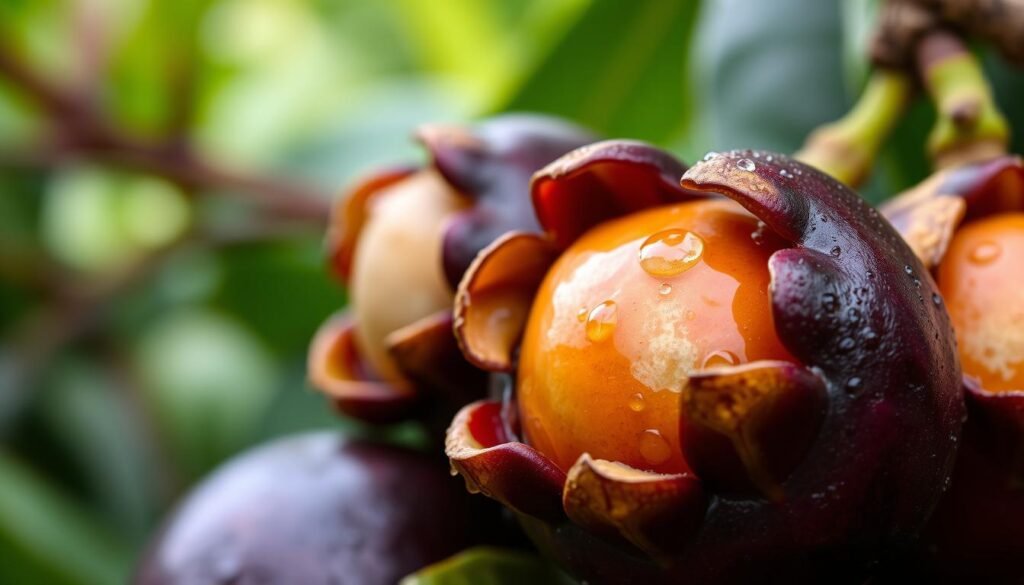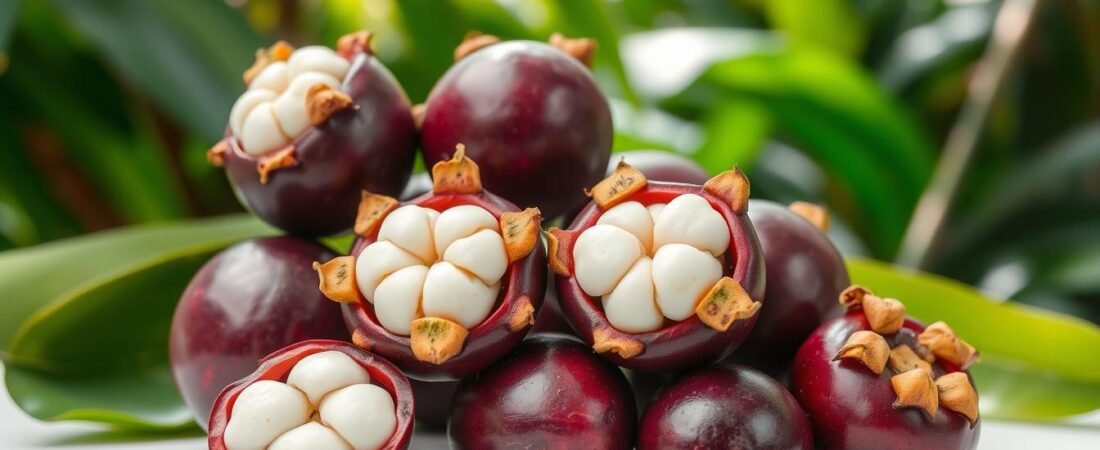Mangosteen, also known as Garcinia mangostana L., is a tropical fruit from Southeast Asia. It’s round, dark purple, with a hard rind and white flesh. It has a sweet and slightly tart taste.
People call it the “Queen of Fruits” because of its taste and health benefits. It’s been used to treat inflammation, infections, and skin problems. The fruit is packed with xanthones, which are antioxidants and anti-inflammatory agents.
Key Takeaways
- Mangosteen is a tropical fruit native to Southeast Asia, prized for its unique flavor and medicinal properties.
- The fruit is rich in xanthones, a type of antioxidant that can help reduce inflammation and support various aspects of health.
- Traditional uses of mangosteen include treating conditions like inflammation, infection, and skin disorders.
- Emerging research suggests mangosteen may offer benefits for weight management, metabolic health, and cardiovascular support.
- Proper storage and possible side effects or interactions should be considered when consuming mangosteen.
But have you ever wondered about the full extent of mangosteen’s health benefits and how it earned the title of the “Queen of Fruits”? Let’s dive deeper into the fascinating world of this tropical gem and uncover the secrets behind its remarkable properties.
Introduction to the Queen of Tropical Fruits
Mangosteen is known as the “queen of tropical fruits.” It’s a fascinating superfruit that’s getting more attention worldwide for its health perks. This fruit is mainly grown in Southeast Asia, where it has a rich history and cultural importance.
Origin and Cultural Significance
Mangosteen grows mainly in Indonesia, Malaysia, the Philippines, and Thailand. These places have loved it for centuries. The tree can grow up to 25 meters tall. It’s believed to have started in Indonesia’s Sunda Islands and now grows in other tropical places too.
Traditional Uses in Southeast Asia
In Southeast Asia, people have used mangosteen for medicine for a long time. They use the fruit, its rind, and even the tree’s bark to treat many health issues. The fruit’s antioxidant-rich qualities, thanks to its xanthones, make it valuable for health.
Physical Characteristics
The mangosteen fruit stands out with its purple rind and white, segmented pulp. Its tangy flavor is like a tangerine, earning it the “queen of fruits” title in its homeland.
Mangosteen trees are special because they have male and female flowers on different trees. This makes pure male trees rare. Most of the time, people grow female trees because they produce the fruit everyone wants.
Nutritional Profile of Mangosteen
Mangosteen is a tropical fruit full of essential nutrients. A single cup (196 grams) of canned mangosteen has 143 calories. It also has 35 grams of carbohydrates, 3.5 grams of fiber, 1 gram of fat, and 1 gram of protein.
Mangosteen stands out for its vitamins and minerals. It has 6% of the daily value for Vitamin C and 15% for Vitamin B9 (folate). It also has 9% for Vitamin B1 (thiamine) and 8% for Vitamin B2 (riboflavin). Plus, it offers 9% for manganese, 15% for copper, and 6% for magnesium.
The fruit’s fiber content is nearly 12.5% of the daily value in a single cup. This makes it great for digestive health, weight management, and blood sugar control. The antioxidants, including Vitamin C, manganese, and xanthones, add to its health benefits.
| Nutrient | Amount per Cup (196g) | % Daily Value |
|---|---|---|
| Calories | 143 | – |
| Carbohydrates | 35g | – |
| Fiber | 3.5g | 12.5% |
| Fat | 1g | – |
| Protein | 1g | – |
| Vitamin C | 6mg | 6% |
| Folate (Vitamin B9) | 60mcg | 15% |
| Thiamine (Vitamin B1) | 0.1mg | 9% |
| Riboflavin (Vitamin B2) | 0.1mg | 8% |
| Manganese | 0.2mg | 9% |
| Copper | 0.3mg | 15% |
| Magnesium | 24mg | 6% |
Mangosteen is known as the “Queen of Tropical Fruits” for good reason. It’s packed with fiber and essential vitamins and minerals. This fruit is a great addition to any diet, thanks to its many health benefits.
The Power of Xanthones: Unique Antioxidants
Mangosteen, known as the “Queen of Tropical Fruits,” is packed with nutrients. It’s famous for its xanthones, a special group of antioxidants. Two of these, alpha-mangostin and gamma-mangostin, are known for their health perks.
Alpha-Mangostin Benefits
Alpha-mangostin is the most common xanthone in mangosteen. It’s been shown to have many health benefits. Studies suggest it might fight cancer cells and help with nerve pain and depression.
Its strong antioxidant powers help fight off harmful free radicals. This could lower the risk of long-term diseases.
Gamma-Mangostin Properties
Gamma-mangostin is another important xanthone in mangosteen. It has been found to have anti-inflammatory effects. It works by blocking certain receptors and genes.
Its antioxidant properties also help protect against chronic diseases. This makes mangosteen a great choice for overall health.
The presence of alpha-mangostin and gamma-mangostin shows mangosteen’s nutritional value. As research continues, we learn more about its health benefits.
Mangosteen’s Anti-inflammatory Properties
Mangosteen, known as the “queen of tropical fruits,” is celebrated for its nutritional value and health benefits. It’s famous for its anti-inflammatory effects.
Studies have shown mangosteen can reduce inflammation. This is key in fighting chronic health issues. A study found mangosteen gel improved chronic periodontitis, a gum disease. Another study suggested mangosteen and propolis could lower gingival inflammation in patients with gum and early periodontal diseases.
Mangosteen’s benefits extend beyond gum health. A study on obese people found mangosteen juice lowered C-reactive protein. This protein is a sign of systemic inflammation. These results hint at mangosteen’s role in fighting inflammation and preventing various health problems.
| Nutrient | Amount per Cup (196g) |
|---|---|
| Calories | 143 |
| Carbohydrates | 35g |
| Fiber | 3.5g |
| Fat | 1.14g |
| Calcium | 23.5mg |
| Manganese | 0.2mg |
| Vitamin C | 5.68mg |
| Magnesium | 25.5mg |
The anti-inflammatory power of mangosteen comes from xanthones, powerful antioxidants. These compounds help control the body’s inflammatory response. This makes mangosteen a natural option for managing chronic inflammation and related health issues.
Weight Management and Metabolic Health
Mangosteen, known as the “Queen of Fruits,” might help with weight and metabolic health. Studies have looked into its effects on weight loss and blood sugar control.
Clinical Studies on Weight Loss
A study on Meratrim, a supplement with mangosteen rind extract, showed great results. It helped 20 people lose weight and improve their cholesterol levels over 26 weeks. The mangosteen group saw a 53.22% drop in HOMA-IR, showing better insulin sensitivity.
Impact on Blood Sugar Levels
Another study showed mangosteen extract helped lower insulin levels in obese females. This suggests mangosteen could improve insulin sensitivity and blood sugar control. These results highlight mangosteen’s possible benefits for weight loss and metabolic health, but more research is needed.
| Key Findings | Details |
|---|---|
| Weight Loss | Meratrim supplement with mangosteen rind extract showed significant decreases in body weight, BMI, and hip circumference |
| Insulin Sensitivity | 400 mg of mangosteen extract daily for 26 weeks reduced insulin levels by 53.22% in obese females |
| Blood Sugar Control | Mangosteen’s impact on insulin sensitivity suggests possible benefits for blood sugar regulation |
“Mangosteen has shown interesting effects on weight management and metabolic health, making it worth further study.”
Skin Health and Beauty Benefits
Mangosteen, a tropical fruit, is amazing for our skin. It’s purple and full of xanthones, which keep our skin young and bright.
Research shows mangosteen extract boosts skin moisture and elasticity. In a study, people who took 100mg of mangosteen extract daily for 12 weeks saw better skin hydration and less aging signs.
The alpha-mangostin in mangosteen fights bacteria and protects our skin. A study found that a cleanser with mangosteen extract cut down acne and inflammation in 8 weeks.
“Mangosteen’s unique phytochemicals and antioxidants make it a true skin superstar, addressing a wide range of concerns from acne to anti-aging.”
Mangosteen does more than just fight acne. It also makes our skin more elastic and moist, fighting aging signs. Its collagen-boosting effects improve skin texture, reduce sagging, and give a youthful glow.
If you want to treat acne, improve skin moisture and elasticity, or fight aging, mangosteen is worth trying. Adding it to your skincare routine could unlock your skin’s natural beauty and energy.

Digestive Health and Fiber Content
Mangosteen is a tropical fruit that’s not just tasty but also packed with nutrients. It’s great for your digestive health and fiber intake. With about 14% of the daily fiber value per cup, it’s a great diet addition.
Gut Health Benefits
Fiber is key for a healthy gut. Mangosteen’s fiber helps with regular bowel movements and feeds good bacteria. A healthy gut microbiome boosts your immune system and reduces inflammation.
Fiber’s Role in Disease Prevention
Fiber in mangosteen helps prevent diseases. Eating foods high in fiber can lower heart disease, type 2 diabetes, and colorectal cancer risks. Adding mangosteen to your diet helps meet fiber needs, which many struggle with.
Mangosteen also has vitamins, minerals, and antioxidants. These support digestive health, weight management, and overall well-being. Eating mangosteen is a tasty way to nourish your body and improve your health.
| Nutrient | Amount per 1 cup (196g) of Mangosteen | % Daily Value |
|---|---|---|
| Calories | 143 | – |
| Carbohydrates | 35g | – |
| Fiber | 3.5g | 12.5% |
| Fat | 1g | – |
| Protein | 1g | – |
| Vitamin C | 6mg | 6% |
| Folate | 59mcg | 15% |
| Thiamine | 0.1mg | 9% |
| Riboflavin | 0.1mg | 8% |
| Manganese | 0.2mg | 9% |
| Copper | 0.3mg | 15% |
| Magnesium | 24mg | 6% |
Cardiovascular Support and Blood Pressure
Mangosteen’s nutritional profile hints at its heart health benefits. Its antioxidants, like xanthones, might protect against heart disease. The fruit’s fiber could also help lower cholesterol, supporting heart health.
A study with 60 participants showed mangosteen drinks boosted blood antioxidants by 15% in 30 days. It also cut C-reactive protein by 46%, a sign of less inflammation. The placebo group saw no such changes.
Another study found Verve energy drink, rich in mangosteen, boosts antioxidants and vitamins B2 and B5. This suggests mangosteen-based products could support heart health and blood pressure.
| Cardiovascular Benefits of Mangosteen | Key Findings |
|---|---|
| Antioxidant Capacity | 15% increase in antioxidant capacity in the bloodstream after 30-day trial |
| Inflammation Reduction | 46% decrease in C-reactive protein levels, a key marker of inflammation |
| Nutrient Availability | Increased availability of mangosteen and essential vitamins B2 and B5 |
More research is needed to fully grasp mangosteen’s heart health benefits. Yet, current evidence suggests it could be good for heart health and blood pressure.

Safe Consumption and Possible Side Effects
It’s important to know about mangosteen’s side effects and how it might interact with other things. Mangosteen is usually safe, but talk to a doctor before using it. This is true if you have health issues or take medicines.
Recommended Dosage
There’s no set amount of mangosteen to take. Studies have used doses from 100 to 800 milligrams a day. They used it for up to 12 weeks without big problems. Start with a small dose and see how you feel before taking more.
Drug Interactions
Mangosteen might not get along with some medicines, like blood thinners. It could make bleeding more likely for people with bleeding problems or those having surgery. It also might not mix well with Donepezil (Aricept) or other blood thinners. Always check with your doctor to make sure mangosteen won’t mess with your medicines.
